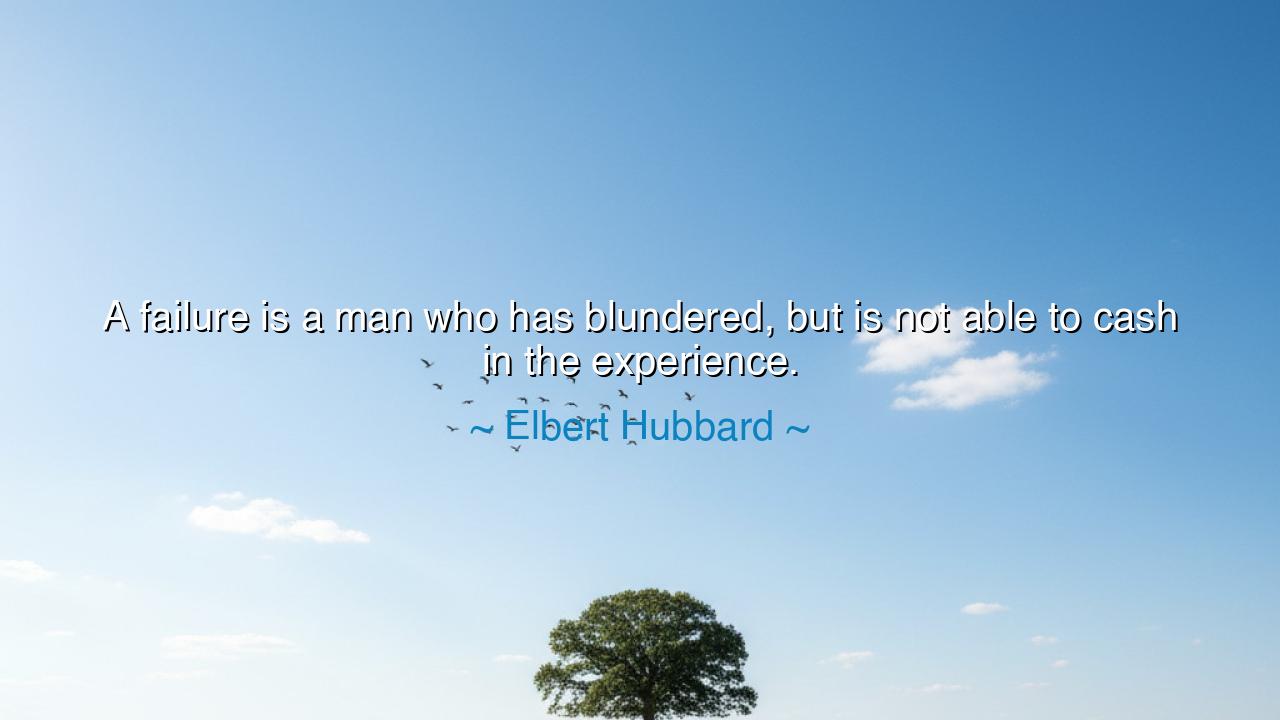
A failure is a man who has blundered, but is not able to cash in






Opening Scene – Narrated by Host
The room was quiet, bathed in the soft glow of the late afternoon sun. Jack sat at his desk, reflecting on a quote that had made him pause. It was from Elbert Hubbard, a writer and philosopher, who had a sharp perspective on failure. The words, “A failure is a man who has blundered, but is not able to cash in the experience,” struck Jack deeply. They made him think about how failure is not an end but a stepping stone—an opportunity to learn and grow, if only we can recognize and seize the lessons it offers.
Jeeny entered the room, noticing Jack's focused expression. She sat down across from him, sensing that something important had caught his attention.
Jeeny: “You look deep in thought. What’s on your mind?”
Jack looked up, still reflecting on the quote, and shared it with her.
Jack: “I was thinking about something Elbert Hubbard said: ‘A failure is a man who has blundered, but is not able to cash in the experience.’ It made me think about how failure isn’t really failure if we can learn from it and use it to grow. Hubbard’s point is that it’s not the blunder that defines us, but whether we’re able to extract the lessons from it and move forward. If we can cash in on the experience, failure becomes a valuable part of our journey, not a setback.”
Jeeny nodded, reflecting on the deeper meaning of the quote.
Jeeny: “That’s a really interesting way to look at failure. So often, we see failure as something we need to avoid at all costs, but Hubbard is suggesting that failure, when approached the right way, can be one of our greatest teachers. The key is being able to take the experience, reflect on it, and apply it to future decisions. It’s not about avoiding mistakes—it’s about using them to improve and grow.”
Jack: “Exactly. Failure only becomes truly damaging when we don’t learn from it. If we keep making the same mistakes without reflecting on what went wrong and how we can do better next time, then we’re not using failure to our advantage. But when we can look back at a blunder and see the lessons it teaches us, that’s when we ‘cash in the experience.’ It’s not just about what happens to us—it’s about how we respond to it.”
Host: Their conversation deepened as Jack and Jeeny explored the idea that failure is not an end but a process—a moment that can lead to growth if we choose to learn from it. Hubbard’s words weren’t just about failure—they were about resilience and the ability to turn setbacks into stepping stones.
Jeeny: “It also makes me think about how failure often gets a bad reputation. People are so afraid of failing that they avoid taking risks, which can actually hold them back. But if we change our mindset about failure, if we see it as a part of the process of learning and growing, we might be more willing to take those risks. We can’t grow without making mistakes—it’s how we learn.”
Jack: “Exactly. Failure is a natural part of the process. The more we can embrace it, the more we open ourselves up to learning. It’s when we avoid failure at all costs that we miss the opportunity to grow. We learn through experience—through both the successes and the setbacks.”
Jeeny: “And sometimes, those setbacks are the most valuable experiences we have. They force us to rethink our approach, to try new strategies, and to become more resilient. Failure isn’t just a lesson in what doesn’t work—it’s also a lesson in how to keep going, how to adapt, and how to come back stronger.”
Host: Jack smiled, feeling the clarity of their conversation settling in. Hubbard’s words weren’t just about the failure itself; they were a reminder that failure is an inevitable and valuable part of the journey. What truly matters is our ability to learn from it, to use it as a tool for growth, and to continue moving forward with the lessons we’ve gained.
Jack: “So, maybe the takeaway here is that failure isn’t something to fear—it’s something to learn from. The key is to reflect on what went wrong, to extract the lessons, and then use those lessons to improve moving forward.”
Jeeny: “Exactly. It’s about changing our mindset around failure. Instead of seeing it as a setback, we should see it as an opportunity to learn and grow. Failure isn’t the end—it’s just a part of the process.”
Climax and Reconciliation
The room felt more grounded now, as Jack and Jeeny reflected on the deeper meaning behind Hubbard’s words. Outside, the world continued its steady rhythm, but inside, they had uncovered something important: failure is not an end but a process—a valuable opportunity to learn, grow, and become stronger. The key to success is not avoiding failure but using it as a stepping stone to something greater.
Jack: “So, maybe the key is to embrace failure as part of the process. It’s not about avoiding mistakes—it’s about learning from them and using the experience to improve.”
Jeeny: “Exactly. Failure only becomes a true setback when we don’t learn from it. If we can extract the lessons and apply them, it becomes an essential part of the journey toward success.”
Host: The conversation settled into a quiet understanding. Failure isn’t something to be feared or avoided—it’s a part of life that can teach us valuable lessons if we choose to learn from it. By embracing failure, reflecting on the experiences it brings, and using those lessons to grow, we turn setbacks into stepping stones on the path to success.






AAdministratorAdministrator
Welcome, honored guests. Please leave a comment, we will respond soon